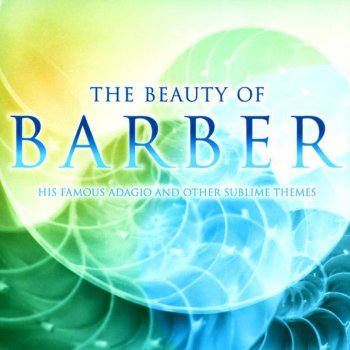Adagio for Strings (Vocal Version) - Samuel Barbertraduction en anglais
Самуэль
Барбер
Samuel
Barber
(1910
- 1981)
(1910
- 1981)
Умирая,
он
вряд
ли
думал
о
своей
жизни
с
удовлетворением.
He
probably
didn't
think
of
his
life
with
satisfaction
as
he
lay
dying.
Впрочем,
кто
знает...
Well,
who
knows...
После
провала
своей
оперы
"
After
the
failure
of
his
opera
"
Антоний
и
Клеопатра"
он
почти
удалился
от
музыки.
Antony
and
Cleopatra,"
he
almost
withdrew
from
music.
Его
произведения
не
играли,
он
был
почти
забыт
при
жизни.
His
works
weren't
played,
he
was
nearly
forgotten
in
his
lifetime.
Барбера
никогда
не
любили
другие
композиторы,
его
современники.
Barber
was
never
loved
by
other
composers,
his
contemporaries.
Может
быть,
это
связано
с
тем,
что
он
никогда
не
выдвигал
"манифестов".
Maybe
it's
because
he
never
put
forward
any
"manifestos."
Он
всё
время
находился
в
поиске,
писал
на
грани
эксперимента,
не
боялся
сочетать,
казалось
бы,
"старомодные,
устаревшие"
приёмы
с
непривычными
диссонансами
и
ангармонизмом.
He
was
always
searching,
writing
on
the
edge
of
experimentation,
unafraid
to
combine
seemingly
"old-fashioned,
outdated"
techniques
with
unusual
dissonances
and
anharmonicity.
И,
в
то
же
время,
оставался
в
стороне
от
"музыкальной
политики",
не
вмешиваясь
в
бушевавшие
тогда
споры
о
"новой
музыке"
и
будущем
искусства...
And,
at
the
same
time,
he
remained
aloof
from
"musical
politics,"
not
getting
involved
in
the
raging
debates
about
"new
music"
and
the
future
of
art...
В
результате,
он
оказался
один
между
враждующими
лагерями,
между
упрёками
в
рутинности
с
одной
стороны
и
обвинениями
в
бессмысленности
с
другой...
As
a
result,
he
found
himself
alone
between
warring
camps,
between
accusations
of
routine
on
the
one
hand
and
accusations
of
meaninglessness
on
the
other...
Ему
приклеили
вывеску
"неоромантиста".
They
labeled
him
a
"neo-romanticist."
Никто
не
знал,
что
это
значит,
но
звучало
очень
обидно.
Nobody
knew
what
that
meant,
but
it
sounded
very
offensive.
Это
была
почти
уверенность
в
бесперспективности
дальнейших
исканий...
It
was
almost
a
certainty
of
the
futility
of
further
searching...
На
его
судьбу
можно
смотреть
с
двух
различных
позиций.
His
fate
can
be
viewed
from
two
different
positions.
Можно
сказать
- этот
человек
не
смог
ничего
добиться.
One
could
say
- this
man
couldn't
achieve
anything.
Всю
жизнь
он
писал
музыку,
сочинял,
мучался,
- концерты,
симфонии,
оперы,
балеты.
All
his
life
he
wrote
music,
composed,
suffered
- concertos,
symphonies,
operas,
ballets.
И
все
усилия
пропали
даром.
And
all
the
efforts
were
in
vain.
Он
не
оставил
школы.
He
left
no
school.
Оперы
не
ставятся,
мелодии
прочно
забыты...
Operas
are
not
staged,
melodies
are
firmly
forgotten...
И
уже
само
имя
затерялось
где-то
в
годах
- бьюсь
об
заклад,
что
ты,
читатель,
никогда
не
слышал
этой
фамилии
- Барбер.
And
the
name
itself
is
lost
somewhere
in
the
years
- I
bet
you,
my
dear,
have
never
heard
this
last
name
- Barber.
Ну
кто
такой
Барбер?
Well,
who
is
Barber?
Очередной
неудачник?
Another
failure?
Звучит
почти
нелепо.
It
sounds
almost
ridiculous.
Я
скажу
по
секрету
--
одно
его
произведение
всё-таки
помнят,
всё-таки
играют,
но,
Боже
мой,
как
это
скучно
- всегда
только
одно...
I'll
tell
you
a
secret
--
one
of
his
works
is
still
remembered,
still
played,
but,
my
God,
how
boring
it
is
- always
just
one...
Так
не
зря
ли
прожита
жизнь,
если
из
всех
долгих
лет
можно
было
бы,
в
принципе,
оставить
только
9 минут?
So
wasn't
life
lived
in
vain,
if
from
all
the
long
years
one
could,
in
principle,
leave
only
9 minutes?
Те
9 минут,
нужные
человеку,
чтобы
"услышать"
эту
единственную
мелодию
и
успеть
записать
её?
Those
9 minutes
a
person
needs
to
"hear"
this
one
melody
and
have
time
to
write
it
down?
Но
можно
взглянуть
на
дело
иначе.
But
you
can
look
at
it
differently.
Его
"
His
"
Адажио
для
струнных"
вошло
в
20ку
произведений
тысячелетия.
Adagio
for
Strings"
entered
the
top
20
works
of
the
millennium.
В
США
это
произведение
до
сих
пор
остаётся
музыкальным
бестселлером,
как
выдержавшее
наибольшее
количество
переизданий
на
компакт-дисках.
In
the
US,
this
work
remains
a
musical
bestseller,
as
the
most
reprinted
on
compact
discs.
Его
неизменно
играют
на
похоронах
всех
значительных
лиц
Америки.
It
is
invariably
played
at
the
funerals
of
all
significant
figures
in
America.
Президентов,
например.
Presidents,
for
example.
Эту
мелодию
знают
почти
все
(или,
по
крайней
мере,
очень
многие).
Almost
everyone
(or
at
least
very
many)
knows
this
melody.
Не
помня,
правда,
зачастую
имени
композитора...
Not
remembering,
however,
often
the
name
of
the
composer...
Её
можно
встретить
на
самых
разных
записях
- саундтреках
к
фильмам,
театральным
постановкам,
в
выступлении
неизвестного
органиста,
в
концертных
бисах...
It
can
be
found
on
a
variety
of
recordings
- soundtracks
for
films,
theatrical
productions,
in
the
performance
of
an
unknown
organist,
in
concert
encores...
И
можно
с
уверенностью
заявить
- Самюэлю
Барберу
удалось
написать
нечто,
принадлежащее
вечности.
And
it
is
safe
to
say
- Samuel
Barber
managed
to
write
something
that
belongs
to
eternity.
Нечто,
что
не
забылось,
когда
имя
его
уже
почти
забыто.
Something
that
was
not
forgotten
when
his
name
was
almost
forgotten.
Музыку,
которую
будут
играть,
когда
последняя
память
о
тех,
кто
с
оркестром
уходил
на
кладбище,
рассеется
как
дым...
Music
that
will
be
played
when
the
last
memory
of
those
who
went
to
the
cemetery
with
the
orchestra
dissipates
like
smoke...
Сам
он,
видимо,
прекрасно
понимал,
что
однажды
из-под
пера
у
него
вышло
нечто,
ему
не
принадлежащее.
He
himself,
apparently,
understood
perfectly
well
that
one
day
something
came
out
from
under
his
pen
that
did
not
belong
to
him.
Évaluez la traduction

Attention! N'hésitez pas à laisser des commentaires.